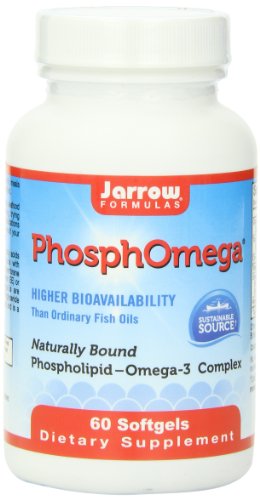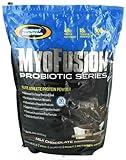Jarrow Formulas PhosphOmega, 1000 mg, 60 Count
Product Description

Product Profile
The omega-3 fatty acids eicosapentanoic acid (EPA) and docosahexaenoic acid (DHA) have been widely studied and shown to support cardiovascular, joint, blood sugar, immune, and brain health.* Numerous scientific studies have demonstrated that omega-3 fatty acids are important for a healthy inflammatory response through the modulation of prostaglandin and leukotriene synthesis. In fact, research on omega-3s is so compelling that the FDA granted a qualified health claim for consuming omega-3s. The American Heart Association recommends consumption of 250-500 mg of EPA + DHA daily to support cardiovascular health. Omega-3s support cardiovascular health by improving cardiac efficiency, reducing myocardial oxygen consumption, increasing stroke volume, and promoting healthy blood pressure.*
Distinguishing Features:
- Combination of Omega-3 Fatty Acids and Phospholipids
- Sustainable Source and Backed by a Certificate of Responsible Fishing
- Higher Bioavailability than Typical Fish Oils

Importance of Phospholipids
Typical fish oil supplements deliver omega-3 fatty acids in the ethyl ester or triglyceride form with the phospholipids being left behind when the oil is initially pressed out of the fish. However, many recent studies have suggested that omega-3s bound to phospholipids have higher bioavailability - PhosphOmega is a fish oil product with its omega-3s naturally bond to phospholipids.
The absorption of omega-3s from phospholipids has been shown to have greater bioavailability than those attached to triglycerides or ethyl esters. As one example, a study of 115 healthy subjects randomized to 1) a daily dose of krill oil containing roughly 40% phospholipids and 543 mg omega-3s, 2) fish oil containing 864 mg of omega-3s as triglycerides, or 3) a placebo oil for seven weeks. Plasma omega-3 concentrations significantly increased in both the krill group and fish oil group, but were similar to each other. At first glance that may seem like a tie, but upon closer inspection one notices that the amount of omega-3s taken in the krill group (543 mg) was only 63% of that in the fish oil group (864 mg). In other words, it only took 2/3 the amount of phospholipid enriched omega-3s to produce the same effect as found with the fish oil. And this doesn’t include the enhanced utilization and targeting effects once in the body. Phospholipid-bound PhosphOmega has significantly higher bioavailability than ordinary fish oils, which need to be emulsified in a complex digestive process. This limits the amount of omega-3 oils the body absorbs. The phospholipids in PhosphOmega powerfully facilitate this emulsifying process, which markedly increases absorption throughout the body and utilization by approximately 50%.

PhosphOmega
PhosphOmega is a complex of phospholipids and the essential omega-3 fatty acids EPA and DHA, 40% of which are supplied bound to phospholipids for greater bioavailability. The product is derived from North Sea sand eel (Ammodytes tobianus). The fish are caught in the pristine waters of the North Sea and The International Fish Meal and Fish Oil Organization has granted our supplier a Certificate of Responsible Fishing, indicating that the fish were caught according to the “global standard for responsible supply. ”
PhosphOmega has undergone extensive testing for environmental contaminants like heavy metals and PCBs. For each undesirable compound, PhosphOmega contains lower amounts than the minimal standards set by the two governing bodies: the Council for Responsible Nutrition (CRN) and Global Organization for EPA and DHA omega-3s (GOED). PhosphOmega also includes 100 mcg of astaxanthin, a powerful natural antioxidant. Astaxanthin may increase the stability of the phospholipid complex in PhosphOmega, ensuring purity and freshness.
*These statements have not been evaluated by the Food and Drug Administration. This product is not intended to diagnose, treat, cure, or prevent any disease.
Amazon.com
The omega-3 fatty acids eicosapentanoic acid (EPA) and docosahexaenoic acid (DHA) have been widely studied and shown to support cardiovascular, joint, blood sugar, immune and brain health.* Numerous scientific studies have demonstrated that omega-3 fatty acids are important for a healthy inflammatory response through the modulation of prostaglandin and leukotriene synthesis. In fact, research on omega-3s is so compelling that the FDA granted a qualified health claim for consuming omega-3s.

Promotes brain function and cardiovascular health*.

40 percent of phospholipids and omega-3 fatty acids supplied are bound to phospholipids for greater bioavailability. View larger.

PhosphOmega is a complex of phospholipids and the essential omega-3 fatty acids EPA and DHA. View larger.

The American Heart Association recommends consumption of 250-500 mg of EPA + DHA daily to support cardiovascular health. Omega-3s support cardiovascular health by improving cardiac efficiency, reducing myocardial oxygen consumption, increasing stroke volume, and promoting healthy blood pressure.*
Imbalance of Omega-6 and Omega-3
It is thought that many health conditions today can be linked to an imbalance in the intake ratio of omega-6 to omega-3 fatty acids. Since 1990 omega-6 consumption has more than doubled, mainly as a result of eating vegetable-based oils like soybean oil. During the same time, no commensurate increase in omega-3s has occurred.
Research in the form of a prospective study that followed more than 45,000 men for 14 years showed that consuming at least 250 mg of the combination of EPA and DHA per day reduced the possibility of sudden cardiac events by 40-50 percent. In another study, 50 percent more people with the highest intake of omega-3 fatty acids had positive outcomes in heart conditions than those people who consumed the least amounts of omega-3 fatty acids.
Importance of Phospholipids
Typical fish oil supplements deliver omega-3 fatty acids in the ethyl ester or triglyceride form with the phospholipids being left behind when the oil is initially pressed out of the fish. However, many recent studies have suggested that omega-3s bound to phospholipids have higher bioavailability -- PhosphOmega is a fish oil product with its omega-3s naturally bond to phospholipids.
The absorption of omega-3s from phospholipids has been shown to have greater bioavailability than those attached to triglycerides or ethyl esters. As one example, a study of 115 healthy subjects randomized to 1) a daily dose of krill oil containing roughly 40 percent phospholipids and 543 mg omega-3s, 2) fish oil containing 864 mg of omega-3s as triglycerides, or 3) a placebo oil for seven weeks. Plasma omega-3 concentrations significantly increased in both the krill group and fish oil group, but were similar to each other. At first glance that may seem like a tie, but upon closer inspection one notices that the amount of omega-3s taken in the krill group (543 mg) was only 63 percent of that in the fish oil group (864 mg). In other words, it only took 2/3 the amount of phospholipid enriched omega-3s to produce the same effect as found with the fish oil.ii And this doesn't include the enhanced utilization and targeting effects once in the body.
Phospholipid-bound PhosphOmega has significantly higher bioavailability than ordinary fish oils, which need to be emulsified in a complex digestive process. This limits the amount of omega-3 oils the body absorbs. The phospholipids in PhosphOmega powerfully facilitate this emulsifying process, which markedly increases absorption throughout the body and utilization by approximately 50 percent.
PhosphOmega
PhosphOmega is a complex of phospholipids and the essential omega-3 fatty acids EPA and DHA, 40 percent of which are supplied bound to phospholipids for greater bioavailability. The product is derived from North Sea sand eel (Ammodytes tobianus). The fish are caught in the pristine waters of the North Sea and The International Fish Meal and Fish Oil Organization has granted our supplier a Certificate of Responsible Fishing, indicating that the fish were caught according to the "global standard for responsible supply."
PhosphOmega has undergone extensive testing for environmental contaminants like heavy metals and PCBs. For each undesirable compound, PhosphOmega contains lower amounts than the minimal standards set by the two governing bodies: the Council for Responsible Nutrition (CRN) and Global Organization for EPA and DHA omega-3s (GOED).
PhosphOmega also includes 100 mcg of astaxanthin, a powerful natural antioxidant. Astaxanthin may increase the stability of the phospholipid complex in PhosphOmega, ensuring purity and freshness.
Note:
If you have a medical condition (especially seafood allergies or coagulopathy), are pregnant, lactating, trying to conceive, under the age of 18, taking medications (especially anticoagulants), or facing surgery, consult your health care practitioner before using this product.
FDA Qualified Health Claim:
Supportive, but not conclusive research shows that consumption of EPA and DHA omega-3 fatty acids may reduce the risk of coronary heart disease.
References
1 Ulven SM, Kirkhus B, Lamglait A, et al. Metabolic effects of krill oil are essentially similar to those of fish oil but at lower dose of EPA and DHA, in healthy volunteers. Lipids. 2011 Jan;46(1):37-46.
About Jarrow Formulas
Jarrow Formulas' complete line of over 350 nutritional products includes vitamins, minerals, probiotics, standardized herbal concentrates, amino acids, enzymes and enteral nutrition products. Customers can be assured of purity, value and potency when choosing these products.
What's in the Box
Jarrow Formulas PhosphOmega-3, 60 Softgels.

Other Products from Jarrow Formulas:









